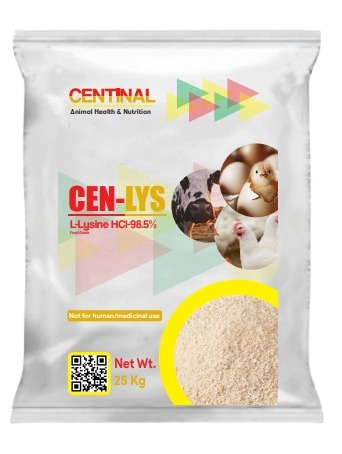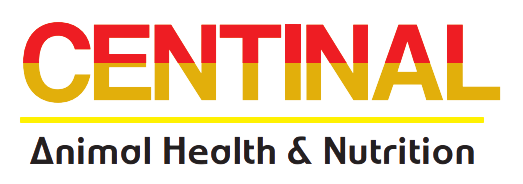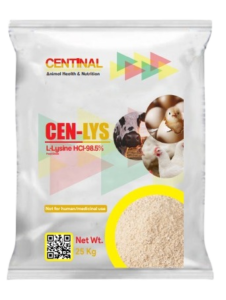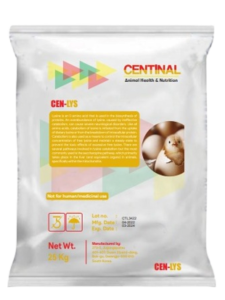L-Lysine Hydrochloride Feed Additive Supplier Exporter Manufacturer
Lysine hydrochloride is an essential amino acid used in poultry diets to help ensure balanced nutrition and flock performance. Lysine seems to prevent the herpes virus from growing. Lysine can fight viruses and is used to combat herpes. It’s also the most important amino acid for monogastric species, including pigs, dogs, cats and chickens. Therefore, it’s sometimes used to enhance farm animal feed. L-lysine helps pets produce antibodies and enzymes that support the immune system. It is also helpful for calcium absorption, which supports strong bones, and it helps promote healthy skin. Lysine is essential for a cat’s health, cats should receive outside sources of this amino acid.
CEN-LYS HCL 98.5%
Lysine is an important amino acid in animal nutrition. It must be provided in all types of animal feed to ensure optimal performance. Especially, L-lysine is an essential amino acid for monogastric animals.
About L-Lysine
Lysine is an essential amino acid that is important for the growth and development of animals. It is particularly important in the diets of livestock such as pigs, poultry, and fish, as these animals have limited ability to synthesize lysine themselves and therefore require it in their diet.
Lysine feed additives are supplements that are added to animal feed to increase the lysine content of the diet. This is important because lysine is an important building block for proteins, and a deficiency in lysine can lead to poor growth, reduced feed efficiency, and other health problems in animals.
There are different types of lysine feed additives available, including synthetic lysine, which is produced through fermentation, and natural lysine, which is derived from plant sources. Synthetic lysine is the most commonly used lysine feed additive, as it is cost-effective and provides a consistent source of lysine.
It is important to note that lysine feed additives should be used in moderation and according to recommended dosages, as excessive amounts of lysine can lead to health problems in animals. Additionally, it is important to ensure that the lysine feed additive used is of high quality and purity, as impurities can affect the efficacy of the supplement and potentially harm the animal.
Lysine is an essential amino acid that is crucial for protein synthesis and is not naturally produced by the body. Therefore, it must be obtained through the diet or supplements. Lysine HCl 98.5% is a high-quality feed grade supplement that is commonly used in the poultry industry to improve the nutritional value of feed.
Lysine Feed Grade: Lysine is a critical nutrient in the diets of livestock and poultry, and it plays a vital role in their growth, health, and productivity. Since lysine is an essential amino acid, it cannot be synthesized by animals and must be obtained from dietary sources. Therefore, lysine supplements are widely used in animal feed to ensure that the animals receive adequate amounts of this essential nutrient.
Lysine HCl 98.5% is a high-quality feed grade supplement that is commonly used in animal feed. It is produced through a fermentation process using bacteria that are capable of producing lysine. The lysine produced in this way is highly pure and free from any contaminants or impurities, making it ideal for use in animal feed.
The benefits of using lysine feed grade in animal feed are numerous. First and foremost, it improves the nutritional value of the feed, which leads to better growth and overall health of the animals. Lysine is a limiting amino acid, which means that its availability in the feed determines the maximum amount of protein that can be synthesized by the animal. Therefore, by adding lysine to the feed, the animal’s protein synthesis capacity is increased, leading to better growth and development.
Lysine feed grade is also essential in reducing the cost of animal feed. When lysine is deficient in the feed, animals cannot utilize the other amino acids present in the feed effectively. This leads to the wastage of other expensive protein sources in the feed, which can be costly for the farmer. However, by supplementing the feed with lysine, the utilization of other protein sources is improved, leading to a reduction in the overall cost of feed.
Lysine Poultry: Poultry is one of the most common types of livestock that require lysine supplementation in their diet. Chickens, turkeys, and other poultry birds require a diet that is high in protein and essential amino acids to support their rapid growth and development. Lysine is a limiting amino acid in poultry diets, which means that its availability in the diet determines the maximum amount of protein that can be synthesized by the birds.
Lysine HCl 98.5% is a popular lysine supplement that is commonly used in poultry feed. It is added to the feed at a rate of around 1-2% to ensure that the birds receive adequate amounts of lysine. The benefits of using lysine in poultry feed are numerous. Firstly, it improves the nutritional value of the feed, leading to better growth and overall health of the birds. Secondly, it helps to reduce the cost of feed by improving the utilization of other expensive protein sources in the feed.
One of the main benefits of using lysine in poultry feed is that it helps to improve the efficiency of protein utilization in the birds. Since lysine is a limiting amino acid in poultry diets, its availability in the diet determines the maximum amount of protein that can be synthesized by the birds. Therefore, by supplementing the diet with lysine, the birds can utilize other protein sources in the feed more efficiently, leading to better growth and development.
Lysine supplementation in poultry diets is particularly important during the early stages of growth when the birds require high amounts of protein and essential amino acids to support their rapid growth and development. During this period, lysine supplementation can help to ensure that the birds receive adequate amounts of this essential nutrient, leading to better growth and overall health.
FAQ's About L-Lysine Feed Grade
What is lysine feed grade?
What are the benefits of adding lysine feed grade to animal diets?
What types of animals can benefit from lysine feed grade?
How is lysine feed grade typically added to animal diets?
What is the recommended dosage of lysine feed grade for animals?
Are there any potential risks or side effects associated with lysine feed grade?
Is lysine feed grade environmentally friendly?
Other Products







